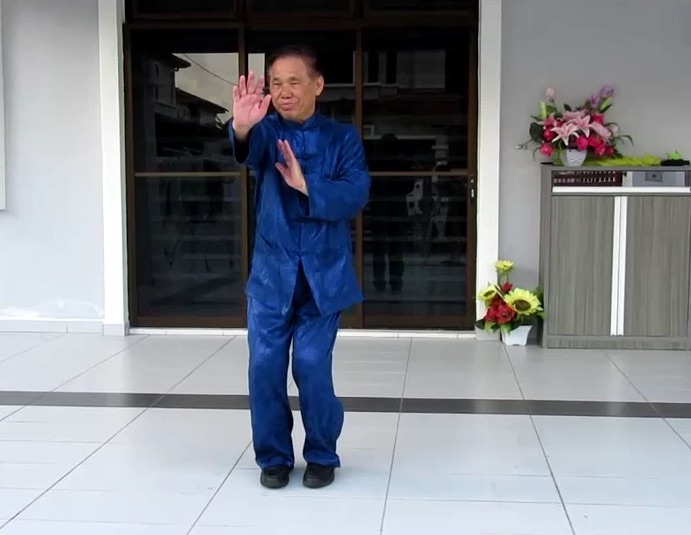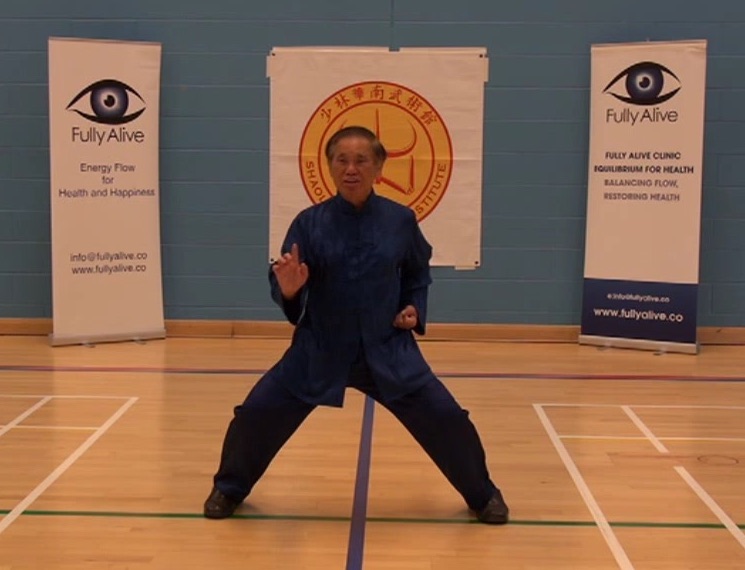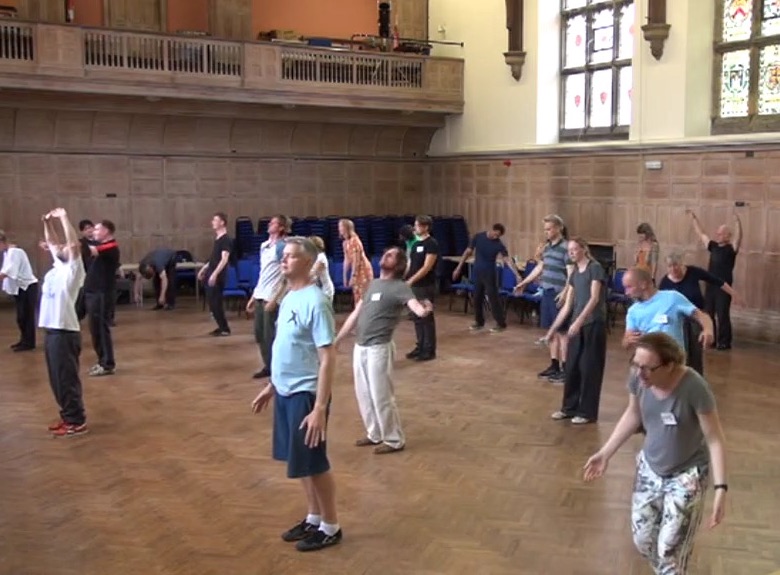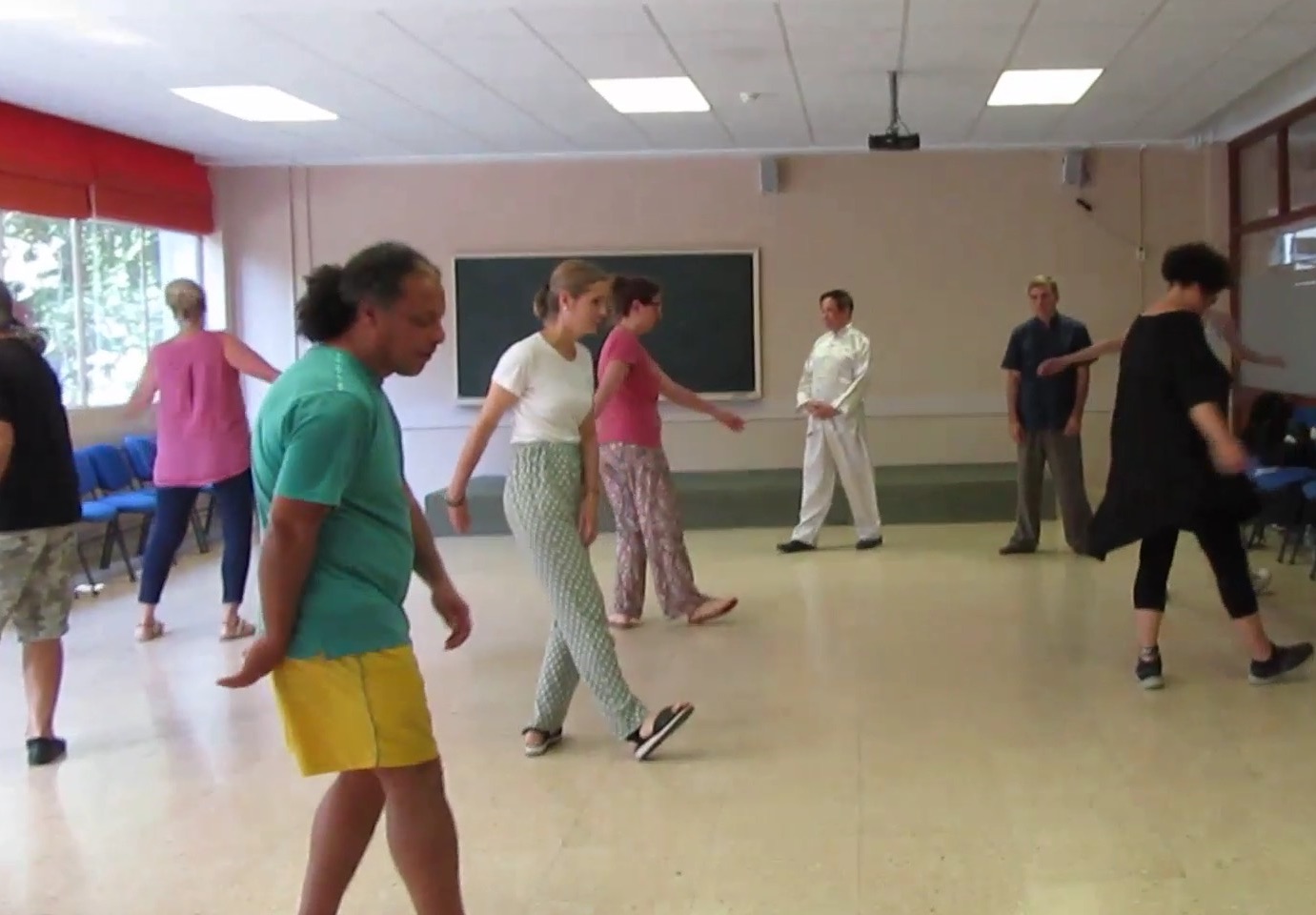SELECTION OF QUESTIONS AND ANSWERS
AUGUST 2020 PART 3

Pi Quan, also known as "Golden Axe Strikes Mountain"
Question 1
I would like to start with the words of my deepest gratitude to you for your help and your teachings. Thank you very very much for everything you have shared so far!
I have been practicing twice a day. Every session included warm-up, then 5-10 minutes of wu ji followed by 20-25 mins of zhan zhuang stance and completing the set with a 30-35 minutes sitting meditation. Over this recent year my energy multiplied, my knee issue is almost resolved and my mind became as quite and clear as never before.
Yet I have an issue which I would like to ask you to kindly help me with. Sometimes, after a very deep meditation and a very good training session, about 3 to 4 hours later I started to experience rather annoying arrhythmia or irregular heartbeat.
— Sergei, Russia
Answer
I suspect that your irregular heart beat is due to some problem you had earlier before your regular training but it was not serious enough to surface. But it really doesn't matter. Even if it were a new problem, it would just go away with the exercise I am going to suggest. That is the wonderful feature of chi kung. It does not matter when the problem was created. The problem will go away with your practice.
You can reduce the time you spend in your training. The ideal time for the training if you have learnt from me directly at an intensive chi kung course is just 10 minutes in the morning and another 10 minutes in the evening or at night. Our chi kung is very powerful; just 10 minutes per training session will be sufficient. Other types of chi kung usually take about an hour.
But you can gradually reduce the time if you enjoy your training session. You can spend the extra time doing whatever wholesome things you want, like getting a girlfriend if you still haven't got one, or spending your time rewardingly with your wife and children if you are very lucky to have them.
The exercise I recommend is "Lifting the Sky" which you can read from my webpages or my books. My website is https://shaolin.org. It is my most favourite chi kung exercise. It gives many other wonderful benefits besides regulating your heartbeat. Many, many people with irregular heartbeats have overcome their problem with this wonderful exercise.
You can add "Rotating Knees" or "Deep Knees Bent" to the exercises you perform regularly. It is nice to walk, but it is not necessary in chi kung training. The remnant of your knee problem will also go away. Enjoy your chi kung practice.
Question 2
I sparred with an expert boxer friend to test myself. The last time I tested myself with him, I was mostly reacting to his attacks -- deflecting, deflecting, looking for an opening and then counter-attacking.
My boxer friend is shorter but far more muscular than me. He skips rope for stamina, punches a heavy sandbag regularly and lifts weight every day. I only practice santi shi and the five elemental fists daily.
Nevertheless I found I had the initiative in this sparring, constantly brushing aside his guard or his punches, and attacking him again and again. I was also relatively comfortable with my breathing, whereas he was panting and had to stop after a while.
My first question popped up during this sparring. My boxer friend shot out a left jab to my chest. I used my leading left forearm to intercept and deflect his left jab. While our forearms were still in contact, I pulled my left fist to my waist and simultaneously attacked his chest with a right pi quan (thrust-palm). However when I pulled back my left fist, my forearm somehow "stuck" to his forearm and jerked him forward and downward. I didn't grab or hook his forearm in any way. My pi quan nearly smashed him in the face. Luckily I managed to stop in time or I may have lost a friend.
When I think about it, this has happened a few times before when I practised partner drills. Sometimes, my partners would complain they didn't understand why they lost their balance forward or to the side when they attacked me and I deflected their attack.
My boxer friend landed a couple of heavy blows to my chest while I was attacking him. The next day, I felt pain when I breathed. I immediately did chi flow that day. The next day when I breathed the pain was gone, but there was still pain when I stretched my chest. Today, the pain is almost gone. While I'm happy I recovered quickly, it still made me realize I was very weak in covering properly and ensuring my safety first before attacking.
— Max, Singapore
Answer
I am glad you have made much progress as evident from your sparring with a Boxing expert.
In my opinion, practicing Santi Shi and the Five Elemental Fist is better than rope skipping, heavy sandbag punching and lifting weight. When you practice Santi Shi and the Five Elemental Fists, you increase your essence, energy and spirit, or in kungfu terminology, you increase your "jing", "qi" and "shen", the three essentials that make up any being; when you skip a rope, punch a heavy sandbag and lift weight, not only you work at a physical level (and not at the energy level and the spiritual level), but more significantly you lose energy. You have to rest for some time before doing any physical and mental work.
Congratulations for having developed "qi" at your arms, as is evident in pulling the Boxer forward and in unbalancing your partners in your drills. The qi at your arms is alive; it will flow to other parts of your body to give you good health, vitality, longevity, peak performance and spiritual joys. There is no special name for this qi. Just carry on your usual training.
It is important to cover your opponent adequately before attacking him. You can refer to my website for Xingyiquan material.
Qi is excellent in overcoming pain. Just practice your qigong, especially Self-Manifested Qi Movement.

One-Finger Shooting Zen
Question 3
When Sitaigung was learning Kung Fu and would come to Sichanggung Yang Fatt Khun's class for two years and only practice one finger shooting Zen, how many repetitions did he have to do? Did he also have to stand in the horse riding stance for a long time like many other practitioners?
— Miguel, Netherlands
Answer
When my sifu, Sifu Ho Fatt Nam, learned from my sigung, Sigung Yang Fatt Khun, he practiced One-Finger Shooting Zen for more than two years. Once awhile my sigung might teach my sifu some techniques. I remember my sifu telling me that someone who learned Taekwondo, as Taekwondo was popular at that time, might have got a black belt.
My sifu was richly rewarded, though he did not know the reward at the time when he was practicing One-Finger Shooting Zen. My sifu promised himself that should he find a worthy sifu, he would just do what his sifu tell him. The rich reward was my sifu developing the skills of dim mark, or dotting vital points. He told me on a separate occasion that he used dim mark only once on a huge man who insulted his mother. My sifu later had to carry the huge man upstairs to give the man remedial work.
One-Finger Shooting Zen for more than two years also gave my sifu another great benefit which my sifu did not mention. My sifu's specialty was chin-na, or gripping vital points, which was one of the three treasures of Shaolin, the other two being dim mark and neigong, or internal arts.
I did not ask my sifu how many repetitions he did when practicing One-Finger Shooting Zen, and whether he stood, or "sat" in kungfu terminology, at the Horse-Riding Stance. I presume he did many repetitions and "sat" at the Horse-Riding Stance. I also did not ask my sifu whether there were other practitioners.
Question 4
I have been doing my best to follow your advice to practice more regularly, but at a lower mind and skill level.
— Ryan, USA
Answer
Our chi kung is of a very high level. It is not easy to impress upon our students how profound our chi kung is. Even masters -- real ones, not those we call out of respect -- have difficulty going into a chi kung state of mind, but we can enter into a chi kung state of mind easily.

What is "low" level chi kung to us, is "high" level to many other people
Question 5
I have to admit that lowering my practice level has been challenging. Can you recommend any adjustments in my approach, or other techniques that may be effective in controlling mind/skill level?
Answer
Don't go too deeply into a chi kung state of mind after you have generated an energy flow; do it before the energy flow.
An effective way of not going too deeply into a chi kung state of mind is to have negative actions. The usual way is to have thoughts and to tense your muscles if necessary. It may not be easy at first because we are so used to clearing our mind and be relaxed. I used the method of tensing my muscles when I sparred with opponents in my younger days. When I knew that I would hit an opponent as he was rushing in, I purposely tensed my muscles so that chi would not get in.
Limiting the physical repetition of a pattern is a good method, but it should be performed after much lowering the chi kung state of mind. We are so used to be in a deep chi kung state of mind, that frequently two or three repetitions are sufficient to produce a powerful energy flow.
Telling the chi to slow down if it starts to become too vigorous is also a good method. But remember that at an advanced stage -- and you are at an advanced stage -- chi flow movement outwardly may be minimal, but chi is flowing powerfully inside the body.
Smiling from the heart is very effective. Before we smile we open the heart, which actually means the spirit. When our spirit is open, we naturally perform anything at a high level. Lower spirits cannot get in because of our chi.
Spend more time in outdoors activities. Be kind to your wife -- in fact you are kind to her all the time.
Question 6
I have gradually increased my practice from a few times a month to every other day, and plan to slowly increase to daily practice.
Answer
Practicing only a few times a month is another way to prevent over-training, but it is not a good method. You should practice every day, but make your practice session short, about 10 to 15 minutes. It is sufficient to practice two sessions a day, once in the morning and once in the evening or at night, but there must be a long gap between the two practice sessions. Use the extra time to do other worthwhile activities

Practicing genuine chi kung makes us energetic and fresh, gives us good health, vitality and longevity, enables us to acheive more in shorter time, and makes us happy and peaceful
Question 7
When we lower our practice level in order to practice every day, when does it make sense to go deep in our practice? Is there any benefit to occasionally going into a deeper chi kung state of mind as part of a regular practice schedule?
Answer
We can go deeply in our chi kung state of mind once a while -- like once a month. Remember that what is "shallow" to us, is actually "deep" for other people. I remember that in my early days of teaching chi kung, some people suggested that I termed my course "masters' chi kung", but I told them, sincerely, that what we did in the course was actually elementary chi kung. You don't have to do anything extra when you go deeply in your chi kung state of mind once a while.
We go deeply in our chi kung state of mind so as to practice our skill. As a result you will find that your mind is very clear, and you can achieve a lot in a short time.
Over-benefit, i.e. more benefit than what the body can take, is bad. It is true that our typical Shaolin Wahnam student can attain ten times what I used to attain in my students' day. Ten times is tremendous. Even two times is a lot. If you achieve a particular result in one month, other people will take two months. If you earn ten thousand dollars a month, other people earn only five thousand. That is only two times.
Question 8
Is there anything we can do to help our bodies adapt better or more quickly to the changes chi kung brings about? Similar to how athletes have techniques for accelerating recovery after exercise, is there anything we can do to help our bodies better adapt to our new energy levels?
Answer
Athletes have techniques for accelerating recovery because their recovery is slow. Over-training is a serious issue in our school, and a very good way to overcome it is to lower tremendously the level of chi kung state of mind.
When you first attended my Intensive Chi Kung Course, you took only 3 days. Other people will be very happy to learn what you have learned in the course in 3 years. That is more than 10 times the effectiveness.
Practicing chi kung will make us energetic and fresh. It will give us good health and vitality, and when you get old, you will have longevity. It will make you achieve more in shorter time, and be peaceful and happy. When you have these benefits, or even some of them, you can gradually increase your chi kung state of mind and your skills. You can help your body to adapt to your new energy levels.
If you have any questions, please e-mail them to Grandmaster Wong via his Secretary at stating your name, country and e-mail address.
LINKS
Selected Reading
- Changing Opinions and Understanding of Xingyiquan
- The Blessing of being a Husband and Father
- Picture-Perfect Form of Wudang Three Harmony Set
- Overcoming So Many Issues
- Shaolin 16 Combat Sequences
